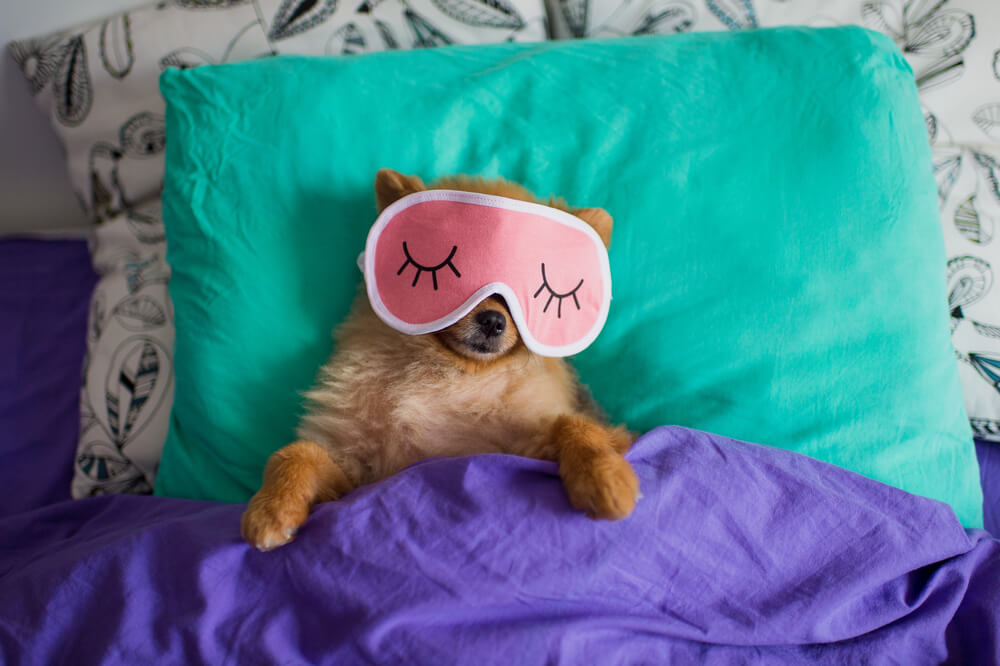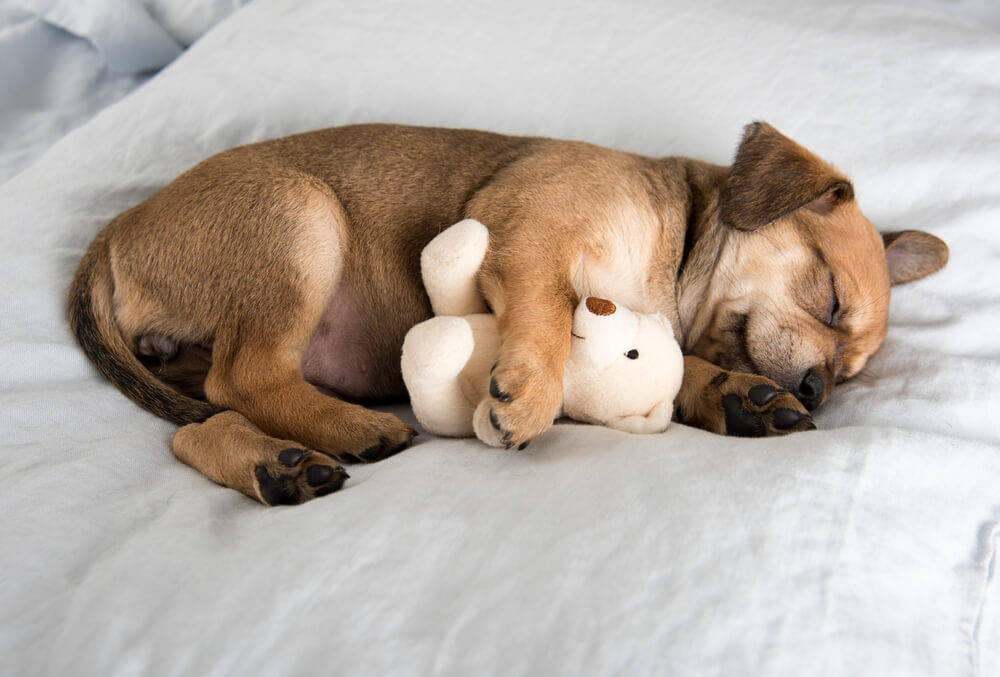How To Help Your New Puppy Sleep Through The Night?

Table of Contents
Listen To The Article
Introduction to How to Help Your New Puppy Sleep Through the Night
When a new puppy comes into your home, it is a time of both great joy and incredible stress.
It takes some time for a new puppy to get used to being in a new environment, and it can take a few weeks to several months for a puppy to feel comfortable enough to sleep through the night.
When a puppy is lacking sleep, it can be a stressful time for you and your new puppy.
One of the many great things about a new puppy is that they make you laugh with their clumsy antics all day long.
However, many dog owners find themselves exasperated at night because their puppy keeps everyone up with their howling and other noises.
While it’s normal for puppies to be noisier at night, excessive barking and howling can be easily controlled or eliminated with the right training.
If you’re taking care of a puppy, you’re already aware that there’s a lot to learn about how to train a puppy.
One of the things you’ll want to learn is how to get your puppy to sleep through the night.
While your puppy might sleep through the night for a week or two, there’s a very good chance that your puppy will wake you up at some point in the night.
As your puppy settles into your home, you’ll probably find yourself getting more than a few hours of sleep a night.
While your pup will sleep for hours at a time during the day, he’ll most likely wake up at night to go to the bathroom and play.
This is when your pup will need your help to learn to sleep through the night.

What To Expect On Your Puppy’s First Night Home
Your puppy’s first night home will probably go one of two ways:
They will be totally exhausted from the excitement of the day and go right to sleep, or
They will have trouble settling in.
Moving to a new home with strangers is a stressful event, even if all introductions go smoothly.
Ask your dog’s breeder, foster family, or rescue organization for a toy, towel or small blanket that smells like your puppy’s mother/siblings or previous home to put in their dog crate at bedtime.
These familiar scents will help them to relax and settle in. Get more crate training tips here.
The younger your puppy is, the less likely it will be that they are able to sleep all the way through the night at first.
Dogs don’t like to soil the areas where they sleep, so if your puppy needs a trip outside during the night, they will start to fuss and cry.
When you hear them crying, take them outside for a short walk, then bring them back inside and put them back in their crate.
Most puppies consistently sleep through the night by 3 or 4 months of age until they’re ready for a dog bed.

Get Them Plenty Of Exercises
Your puppy is much more likely to sleep through the night if they’ve been tired out during the day.
Even if your puppy is not yet allowed on walks because he hasn’t been fully vaccinated, it’s super important to provide him both mental and physical stimulation inside the home and, if you’re lucky enough to have one, in an enclosed yard.
Play with toys, chase each other around and work on training games.
Outside, you can begin getting your puppy comfortable with a leash and walk them in laps around the property.
Feed your dog from puzzle toys to engage their brains while they eat.
In your puppy’s list of daily activities, make sure they have enough playtime and training exercise to help stimulate their minds and burn off some of that excess puppy energy.
Young pups need a lot of sleep, roughly eighteen hours, so interspersing their playtime throughout the day will help manage their bouts of energy and provide ample opportunities for them to get their needed rest.
If you notice your puppy exhibiting behaviors like becoming more nippy, barky, or whiney during play, that can be a sure sign that they are overtired and need a nap.
When possible, try ending playtime before this begins to happen to help your pup settle down and fall asleep faster, as opposed to trying to calm them from a more amped-up state, which can make it more challenging.

Establish A Sleeping Place
When bringing home a new puppy, it is important to establish their very own sleeping place which can come in the form of a kennel or a crate.
This area should be big enough for them to stretch out and maneuver around.
The sleeping area should be lined with a newspaper in case of any accidents as well as a dog bed/pillow in a separate raised area so the puppy is not sleeping in its own waste.
Don’t buy an expensive dog bed for a new pup, because he’s likely to chew it up.
Line the bottom of the crate with a soft, felted, inexpensive blanket or two.
Beware of wool blankets or mats that can be chewed apart into long strings that cause choking.
If you can, bring home a soft toy or baby blanket that smells like the pup’s mom and keep that in the crate.
Many owners place the puppy’s crate in their bedroom, so he can feel that his family is close by.
Let your dog find his place
Once you’ve chosen where your puppy will sleep and what in, it is time for you to train them where and when to go there in their own free will.
Never pick up your dog and place them there as they will perceive this as a negative, instead, lead it there with treats so they connect bedtime with a positive thing.
Their sleeping place should also be very appealing to them with warm blankets, soft and comfortable bedding, and located somewhere they like.
It can also be a good idea to allow them to take their favorite toy for comfort or leaving the radio on for a couple of hours at low volume to help them sleep.
Don’t ever use their bed as a form of punishment as they can become stressed at bedtime due to them thinking they are being punished.
Don’t let your dog sleep on your bed straight away
It may be hard at first to not have your puppy sleep at the foot of your bed, however it is both your best interests to associate bedtime with their kennel or crate.
Later on, you can slowly allow them to sleep on your bed.
If they cry or bark, it is important to ignore this behavior as if you pander to them it can reinforce them to think that they can call upon you whenever they want.
Keep his sleep area quiet and dim
If you watch TV in bed, keep the volume down and the light low. You may even want to use blackout shades if the room gets early morning light.
The quiet and dark will be his cue that it’s time for sleep.
If your crate is the wire type, you can put a cover over the top of it to make it darker and more den-like.
Encourage toilet time before it’s time to go to bed
First, make sure your puppy has had a chance to go to the bathroom and has plenty of physical and mental exercise during the day.
Teach him to love getting into his crate by rewarding him with a treat.
While he’s learning the routine, be prepared for some whining, barking, or howling before he settles in for the night.
Be prepared for interruptions.
Just like human babies, puppies sometimes are not yet ready to sleep through the night.
Your puppy may need a poop break during the night.
If he’s sleeping in a crate in your bedroom, you’ll be able to respond if he needs to go out.
Calmly carry him outside, praise him quietly when he goes and put him right back in the crate for sleeping.

Establish A Bedtime Routine
By giving him a routine right from the start, you’ll teach him that nighttime is for sleeping, and you both will get a better night’s sleep.
Restrict the pup’s intake of food and water for several hours before bedtime.
Play with him, cuddle him, and take him outside to relieve himself.
Make bedtime feel like bedtime.
When bedtime rolls around, make your home feel comfy-cozy.
Dim the lights, put on some soft classical music, and give your puppy a soft nest to snuggle up in.
Try including an item of your clothing in their bedding so your pup feels close to you.
Dog Appeasing Pheromone (DAP) collars and diffusers release a calming pheromone that can also help to soothe your puppy.
Toys that emit a “heartbeat” can also help get your puppy to sleep.

Don’t Feed Them Too Late In The Day
If your puppy’s last meal of the day is a few hours before bedtime, they’ll be able to digest it in time.
If you cut it much finer than this, you run the risk that they will need to go to the toilet in night.
Their drinking can be more flexible as you don’t want your puppy to be thirsty during the night.
On the other hand, it can be tricky to get the right balance so they don’t need to pee in the night either.
However, dogs are very good at regulating their water intake so shouldn’t be prevented from drinking water when they want to.

Reward Good Sleeping Behavior
Both Joan and Paul use and encourage positive reinforcement to train puppies to adopt desirable behaviors.
However, you shouldn’t try to train your dog to just go to sleep.
Sleep is a biological need so I wouldn’t reward or punish a dog when it comes to sleeping.
What you can do is encourage the behaviors that lead up to sleep.
If owners want the dog to sleep in a particular area, such as a crate or dog bed, then they’ll need to train the puppy to sleep there.
Rewarding for going to these places will help set the pup up for success.



